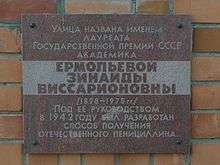Zinaida Yermolyeva
Zinaida Vissarionovna Yermolyeva, also spelled Ermol'eva (Russian: Зинаида Виссарионовна Ермольева) (October 27 [O.S. October 15] 1898 – December 2, 1974) was a Soviet microbiologist of Don Cossack origin most notable for independently synthesizing penicillin for the Soviet military during World War II. She was a member of the USSR Academy of Medical Sciences at the time of her death.[1]
Zinaida Ermol'eva | |
|---|---|
| Born | Zinaida Vissarionovna Ermol'eva October 27, 1898 |
| Died | December 2, 1974 (aged 76) |
| Alma mater | Southern Federal University |
| Known for | Inventor of Penicillin in the USSR |
| Awards | Order of Lenin |
| Scientific career | |
| Fields | Microbiology, Epidemiology |
Career
In 1921, Ermol'eva graduated from the medical faculty of Donskoy University. From 1925 on, she acted as the head of several microbiology and epidemiology institutes in Moscow.[2]
In 1925, Ermol'eva was appointed head of the Department of Microbial Biochemistry at the USSR Academy of Sciences. There, she began her research on bacteriophages and naturally-occurring antimicrobial agents—lysozyme in particular. During the Second World War, she isolated a penicillin-producing strain of Penicillium crustosum. It was first used in Soviet hospitals in 1943.[3]
In 1942, she published the results of an experiment performed on herself, where she infected herself by drinking a solution of Vibrio cholerae and recovered after treatment.[4] The results of her research were seen as essential in preventative measures against cholera in Russia's war efforts in the Eastern Front of World War II.[2][5]
In 1947, Ermol'eva became the director of the newly formed Institute of Antibiotics of the USSR Ministry of Public Health.[6] From 1952 until her death, she headed the Department of Microbiology of the Central Post-Graduate Medical Institute in Moscow (now the Russian Medical Academy of Postgraduate Education).[2][7]
Ermol'eva was married to the microbiologist Lev Zilber, whose brother, the novelist Veniamin Kaverin used the career of Ermol'eva and her husband as a basis for a fictionalized account in his trilogy Open Book (1949–56).[8] The "lively and realistic" depiction of Tatiana, the character based on Ermol'eva, popularized microbiology as a possible career among girls in the Soviet Union.[9]
Awards and recognition

- The State Stalin Prize (1943)[10]
- Twice Order of Lenin
Scientific interests
- Antibiotics
- Bacterial polysaccharides
- Biologically active substances from animal tissues
- Interferon
- Chemotherapy of infection
Scientific writing
Ermolieva was the author of more than 500 papers, several books, such as "Penicillin", "Antibiotics, Bacterial Polysaccharides, Interferon" and others. She was the founder and chief editor of the Soviet journal "Antibiotiki" ("Antibiotics").
Tribute
On October 24, 2018, Yermolyeva was celebrated with a Google Doodle for her achievements.[11]
References
- "Obituary: Zinaida Vissarionova Ermolieva". Journal of Antibiotics. 28 (5): 399. 1968.
- Кноповым, М.М.; Клясовым, А.В. "История РМАПО: Зинаида Виссарионовна Ермольева — создатель первого отечественного антибиотика" [History RMAPO: Zinaida Vissarionovna Yermolyeva - Creator of the first domestic antibiotic] (in Russian). Russian Medical Academy of Postgraduate Education. Retrieved 16 January 2016.
- Ford, J.B. (2014). "Crisis Point: The Rise and Fall of Penicillin" (PDF). The Microscope. 62 (3): 123–135.
- Arsen P. Fiks; Paul A. Buelow (2003). Self-experimenters: Sources for Study. Greenwood Publishing Group. p. 70. ISBN 978-0-313-32348-5.
- Karpova, Lisa (1 Feb 2013). "Seventy years after the Battle of Stalingrad". Pravda.ru.
- Commire, Anne; Klezmer, Deborah (eds.). Dictionary of women worldwide : 25,000 women through the ages. Thomson Gale. p. 612. ISBN 0-7876-7585-7.
- Tsarevskaya, Lyubov (25 April 2012). "Madam Penicillin". Voice of Russia.
- An Anthology of Jewish-Russian Literature, ed. Maxim D. Shrayer, Routledge: London & New York, 2015, p. 269 ("Veniamin Kaverin")
- Anna Eremeeva, "The Woman-Scientist in Soviet Artistic Discourse", in: Edith Saurer et al., Women's Movements. Networks and Debates in post-communist Countries in the 19th and 20th Centuries, Köln: Böhlau Verlag, 2006, p. 347
- "Zinaida ErmolEva". Great Soviet Encyclopedia (3rd ed.). Gale Group. 1979.
- "Celebrating Zinaida Ermolyeva". Google. October 24, 2018. Retrieved October 28, 2018.
